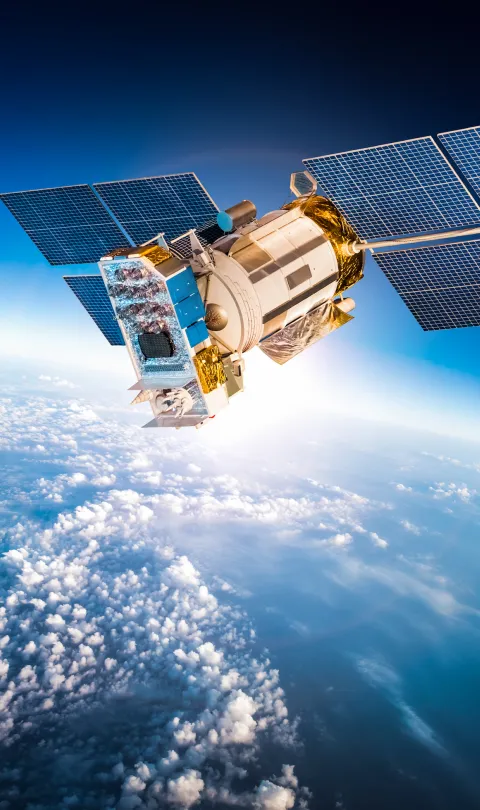The US-Soviet space race saw the first weather satellite launched into orbit in 1959, armed only with basic computing power and a primitive ability to measure cloud cover as it orbited the earth. More than half a century later, advancements in space and satellite technology are providing us with truly incredible tools in support of climate change mitigation, biodiversity conservation, food security, and humanitarian aid.
D-MOSS, a UK Space Agency-funded program in Cambodia and Vietnam, uses pioneering satellite technology to predict the location and intensity of dengue fever outbreaks up to six months in advance, helping public health officials develop location-specific strategies to control the outbreaks before they occur. Forests 2020, an Ecometrica-led Earth Observation system, works with the Ghanaian Forestry Commission to track and reduce critical deforestation areas and improve sustainable cocoa farming.
Yet while modern space technology provides us with terabytes of useful climate information, sifting through and translating this data into effective climate action is by no means easy. The communication of risk and uncertainty in climate modeling remains a topic fraught with difficulty, and even well-intentioned climate services can result in unintended negative impacts if they exacerbate existing inequalities. As with any field of practice in which lives and livelihoods are at stake, providing data in an accidentally harmful way can have significant ethical consequences for the communities involved.
The importance of ethics in climate information
Consider, for example, an agricultural climate service that aims to provide planting season forecasts to farmers by distributing this information freely online. In a season where drought and poor crop yields are predicted, local banks can end up using this information to deny credit and loans to the very same farmers the service intended to help. Similarly, imagine a satellite-driven climate service that aims to help pastoral herding communities best prepare for extreme weather events like subzero temperatures, snowstorms, sandstorms, and flash floods. Though providing these tailored forecasts and recommendations can prove very helpful, they can also result in regional conflicts when different pastoral communities converge on the safest grazing zones.
Climate service ethics is a new and—quite honestly—fascinating field of study that examines situations like these, and aims to understand what ethical dilemmas occur during the production and provision of climate information. This field has become particularly relevant with the advent of modern space technology, thanks to the terabytes of climate data produced by earth observation satellites and the applications of new and collaborative tools for community-driven climate adaptation.
As in both of the situations above, advance consideration of the potential ethical issues involved in providing climate information could lead to better strategies for climate change adaptation and mitigation. From collaborating with farmers to develop a more targeted method of forecast dissemination, to developing regulations that will minimize pastoral stakeholder conflict, fostering a better understanding of climate service ethics can help improve trust and communication between researchers, policymakers, and the communities they wish to serve.
Applying data ethics to climate justice
Yet climate service ethics examines more than simply unintended negative impacts. It combines questions from data ethics with important discussions in climate justice, distributive justice, and professional and business ethics. It asks, for example, who currently has access to climate information, and how might the unexamined provision of this information be unintentionally perpetuating systems of oppression? It asks who will have access to climate information, and how might vulnerable groups be disadvantaged if the ongoing commercialization of climate information diverts this useful knowledge away from the public sphere? And finally, in cases such as those that result in unintended negative impacts, climate service ethics asks how we can improve our future actions when providing this information. Can or should we do this by professionalizing climate services, or by developing field-wide quality standards, or a code of ethics?
How can we build trust in data and among communities for climate action?
Though several frameworks have been proposed that would guide the ethical provision of climate information and services, no agreed standards or regulations have yet been enacted field-wide. Implementing these ethical or quality standards would be key to building trust in climate data and among communities for climate action, as it would help guide ethical conduct and best practice, develop mechanisms for accountability and quality assurance, and improve the transparency of climate service tools and procedures.
This implementation of ethical and quality standards—both by developing the standards themselves, as well as the infrastructure with which to enforce them—would significantly work to improve trust between those who provide tools for climate information and those who use them. Professionalizing climate services with required training, accreditation, and a code of ethics is one such method of accomplishing this goal; developing voluntary standards that users can demand from those they work with is another (e.g., the ISO 14090 Standards). Though each route to regulation differs in its specifics and strength, both measures would help codify a public service orientation into the provision of space-driven climate information, and would provide users with stronger protections against bad practice. These two outcomes alone would substantially help to ensure the ethical provision of climate information and services, and further would help build trust in data and among communities for climate action.
